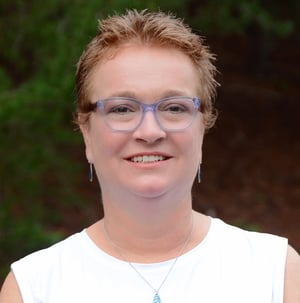Celebrating Women in Leadership: Jennifer Thomas, 48forty CFO
48forty is profiling some of the many accomplished women on our team in honor of International Women’s Day on March 8. Today we talk with Jennifer Thomas, CFO.
In honor of International Women’s Day on March 8, a day dedicated to celebrating the many achievements of women, 48forty is profiling some of the many accomplished women on our team.
Today, we are profiling our Chief Financial Officer, Jennifer Thomas, who does an incredible job for our company and is a role model for aspiring leaders, regardless of gender.

48forty: What brought you to 48forty?
![]() Jennifer: I spent 23 years with a larger electrical manufacturer, working in nine different locations, including two international assignments. When I was looking for a new challenge, I looked into private equity-owned companies and got the position of CFO at a Grey Mountain Partners portfolio company. Grey Mountain sold that company and I was looking for a new opportunity. When 48forty came available, I was excited about using the skills I had acquired at the previous GMP portfolio company to help make 48forty GREAT.
Jennifer: I spent 23 years with a larger electrical manufacturer, working in nine different locations, including two international assignments. When I was looking for a new challenge, I looked into private equity-owned companies and got the position of CFO at a Grey Mountain Partners portfolio company. Grey Mountain sold that company and I was looking for a new opportunity. When 48forty came available, I was excited about using the skills I had acquired at the previous GMP portfolio company to help make 48forty GREAT.
What were the significant moments in your journey to becoming 48forty’s CFO?
![]() In any business, it all comes down to people. With the correct people in the correct job, we will flourish. What gets me energized is helping people understand how the things they do on a daily basis impact 48forty’s results. Small things are significant: helping a plant manager understand why invoicing everyday matters (receivables get paid faster—cash for the business) or helping a salesperson understand the sale is only step one. Giving people insight makes them better at their jobs.
In any business, it all comes down to people. With the correct people in the correct job, we will flourish. What gets me energized is helping people understand how the things they do on a daily basis impact 48forty’s results. Small things are significant: helping a plant manager understand why invoicing everyday matters (receivables get paid faster—cash for the business) or helping a salesperson understand the sale is only step one. Giving people insight makes them better at their jobs.
[The value of recycled pallets is on the rise. Here's how to make sure you're maximizing your income from pallet retrieval transactions.]
I also learned early in my career that the best way to problem solve was to listen to and respect our team members. Say we had an inventory issue. The operators on the floor are the experts; they know the flaws in the processes and have ideas to resolve them. With their help, we can turn manufacturing process flaws into better results in the company’s financials. Understanding the process flows of a business is essential to securing better results and realizing this has helped my career.
As you look back, what were the significant relationships that helped you in your journey to CFO?
![]() Early in my career, I had a great mentor who told me to take all the opportunities that came to me and be the person other people wanted to work with. He taught me that it was ok to ask questions and speak up if I didn’t understand an answer that was given. Most of all he taught me that you can't learn the business by sitting in your office. You need to engage with people across a company’s operations to have a positive impact and be respected.
Early in my career, I had a great mentor who told me to take all the opportunities that came to me and be the person other people wanted to work with. He taught me that it was ok to ask questions and speak up if I didn’t understand an answer that was given. Most of all he taught me that you can't learn the business by sitting in your office. You need to engage with people across a company’s operations to have a positive impact and be respected.
What skills are important to being a CFO, and how did you acquire them?
![]() The first step is to build a foundation of knowledge, which I did by earning an undergraduate degree and MBA in Finance. To advance in any career, you need to be technically competent, willing to work hard and be brave. After that, it’s about taking risks and creating opportunities for yourself to continue to learn and expand your knowledge base. The accumulated knowledge and life experiences can be parlayed into new opportunities.
The first step is to build a foundation of knowledge, which I did by earning an undergraduate degree and MBA in Finance. To advance in any career, you need to be technically competent, willing to work hard and be brave. After that, it’s about taking risks and creating opportunities for yourself to continue to learn and expand your knowledge base. The accumulated knowledge and life experiences can be parlayed into new opportunities.
Were you always brave?
![]() In all honesty? No. There were two times where I made career moves that terrified me. The first was leaving accounting where I was comfortable to become a manufacturing manager of a highly engineered product and having no technical knowledge. I learned very quickly to rely on my team to teach me about the product, processes, and ultimately, the importance of listening. The second was taking on the role of integration finance lead for a corporate acquisition that had operations in 17 countries. For the first time, I was working globally, learning the cultural differences in business practices and honing my negotiating skills. Neither role was easy, but they brought me to where I am today: confident in my skills, able to figure things out, and unafraid to say, “I don’t know, but I’ll get you an answer.” As women, we can’t be timid in business. Being brave, having confidence; that’s empowering.
In all honesty? No. There were two times where I made career moves that terrified me. The first was leaving accounting where I was comfortable to become a manufacturing manager of a highly engineered product and having no technical knowledge. I learned very quickly to rely on my team to teach me about the product, processes, and ultimately, the importance of listening. The second was taking on the role of integration finance lead for a corporate acquisition that had operations in 17 countries. For the first time, I was working globally, learning the cultural differences in business practices and honing my negotiating skills. Neither role was easy, but they brought me to where I am today: confident in my skills, able to figure things out, and unafraid to say, “I don’t know, but I’ll get you an answer.” As women, we can’t be timid in business. Being brave, having confidence; that’s empowering.
[Do you know how much pallets affect your overall product costs? See how making the switch to recycled pallets can give your business a competitive edge here.]
What advice would you give aspiring women professionals on managing their leadership journey?
![]() I actually have two pieces of career advice. The first is don’t be afraid to ask questions. No one has all of the answers and the different functional groups within a company—sales, operations, finance—look at issues differently. Having a natural curiosity and wanting to improve the business by asking questions helps bridge the gap between functions and find the best solutions. My second piece of advice: be open to trying new things, whether it’s a new position or role within a company, a different geographic location or managing a diverse workforce. Change is challenging and makes you a better leader.
I actually have two pieces of career advice. The first is don’t be afraid to ask questions. No one has all of the answers and the different functional groups within a company—sales, operations, finance—look at issues differently. Having a natural curiosity and wanting to improve the business by asking questions helps bridge the gap between functions and find the best solutions. My second piece of advice: be open to trying new things, whether it’s a new position or role within a company, a different geographic location or managing a diverse workforce. Change is challenging and makes you a better leader.
As a 48forty leader, what would you like your legacy to be?
![]() The ultimate goal is to create a team that has more knowledge and insight than when we began. I hope to inspire future leaders by recognizing and enhancing their talents through education and support. This is how we achieve sustainable leadership.
The ultimate goal is to create a team that has more knowledge and insight than when we began. I hope to inspire future leaders by recognizing and enhancing their talents through education and support. This is how we achieve sustainable leadership.

